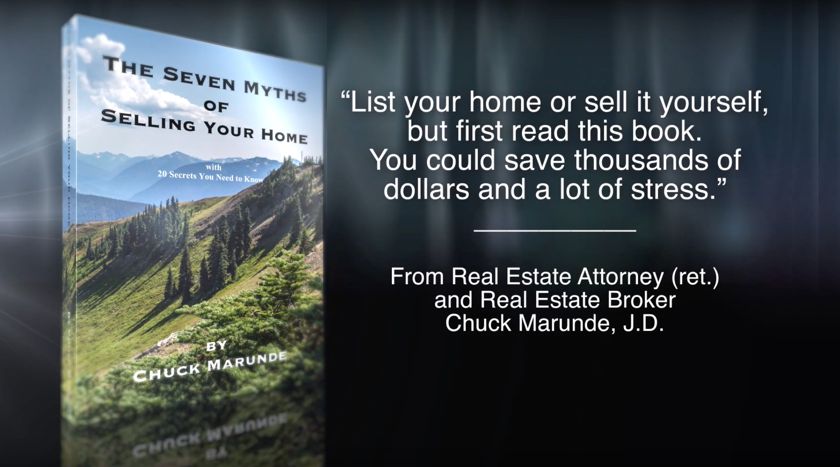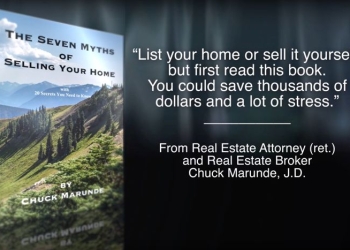Introduction to 5 Installments: Selling your home is no small matter, and since I’ve been in the real estate business going back four decades and transitioned from traditional marketing to powerful Internet marketing technologies, I’ve seen a lot of changes. While consumers are quite aware of the changes in how they search for homes and do online research, and how they do not respond to old print advertising and other worn out sales gimmicks, the real estate industry itself has lagged far behind. I’ve watched too many good people get caught up in the nonsense of agents’ gimmicks and listing presentations. Having written many books for buyers, I finally could not contain myself any longer, and I decided to share what I’ve learned that home owners definitely would want to know if only someone would tell them. This is the third installment of five from my book, The Seven Myths of Selling Your Home.
If you decide to try a new restaurant, and it turns out to be a bad decision, it’s not a big deal. You may have wasted $20.00. But when it comes to selling your home, you could lose tens of thousands of dollars with a bad decision. And you could lose a year or two of precious time. At the age of 65 or 70 what price would you put on a year of your life? What value would you put on a one year delay of precious plans to live somewhere else, perhaps closer to the grandkids? If you are fully informed about what it takes to sell your home, you can make wise decisions, get your home sold as soon as practical, and net the most money possible from the sale of your home.
But you’ve got to be able to separate myth from fact. This book will help you do that. There’s so much to know and learn about selling a home in today’s market. Several years ago I wrote a book specifically for real estate agents entitled The New World of Marketing for Real Estate Agents. In that book I made my best arguments to my colleagues in the real estate industry that we need to adapt our business models to meet consumers where they are, and to better market our listings to the most qualified buyers using the most powerful marketing tools. I was not bashful about being critical of old fashioned and outdated practices, but I was writing directly to my fellow Realtors® around the country. That book received some high praise, including a strong endorsement from a well known national real estate instructor and motivational speaker, Tom Hopkins. If you have an interest in knowing more about what is working and what is not working on the business side of real estate, you might enjoy that book.
[You might enjoy another book I wrote entitled Real Estate From Bricks & Mortar to High Tech Virtuality. This is an ebook and it’s only $4.99, but it is packed with relevant newsworthy information about how marketing has transitioned to high technology today from traditional advertising that is dead. You can preview it from the link to Amazon.]
The Seven Myths of Selling Your Home is written directly to home owners who want to sell their homes now or in the near future. So the focus of this book is to help homeowners think through the issues that are most important when it comes to selling a home, issues like marketing and advertising, reaching qualified buyers, negotiating, handling the due diligence issues, and hiring a real estate agent.
I spend a lot of time on what you need to know when it comes to hiring a listing agent. This is important, because I learned that the vast majority of home sellers do not know what to look for in a listing agent. Few have developed a good interview checklist, so I have done the hard work for you and included one in this book. You should not be looking for the perfect Realtor, because there’s no such person. But you definitely want to find a really good one, and there is an intelligent way to go about that. [You’re welcome to take my online survey entitled Survey: Hiring a Realtor. It’s anonymous and I’ll be sharing the results when we have enough completed surveys.]
There are many traps for the unwary homeowner who wants to sell his home, and traps are usually hidden or disguised, which means they catch many people by surprise. I’ve spent a lifetime helping clients avoid these traps, and it’s been quite an education. Thousands of home sellers get caught by traps that they could have avoided if only they had known.
Why isn’t all of this well known and publicized? The answer will not surprise you. People who get burned in real estate or who had a bad experience with a real estate agent don’t like to spend money to hire an attorney, and they rarely file written complaints with regulatory agencies or associations. In addition, newspapers have no stomach for investigating and reporting problems in the real estate profession, because a major source of their revenue is from brokers. The result is that home sellers like you never hear about all the people who have experienced nightmares, and therefore you don’t get the opportunity to learn from their mistakes, until you work with me, and then decades of client experience are all yours for the asking, and I don’t charge a penny more than any other Realtor.
The answer for the vast majority of home sellers who have been caught by a trap for the unwary is not to pour a lot of energy and money down a black hole with no resolution. Holding someone accountable for bad advice is almost always a dead end in real estate transactions, and we all know the justice system is broken. In addition, people who have had a bad experience often feel guilty about their part in the decisions that were made, and they experience a combination of emotions, including frustration, anger, guilt, and remorse. Instead of sharing their experience to educate others and help them avoid the same nightmare, they decide to quietly move on with their own lives. This is not a criticism. The truth is, it is probably healthier to move on and not dwell on the negative experience.
This is Part 3 of 5 installments. For more information about my book, which you can get in either the Kindle version or the paperback version, you can preview it on Amazon at The Seven Myths of Selling Your Home.
Read the next installment, Part 4 of How to Sell Your Home.
Last Updated on June 6, 2024 by Chuck Marunde





























